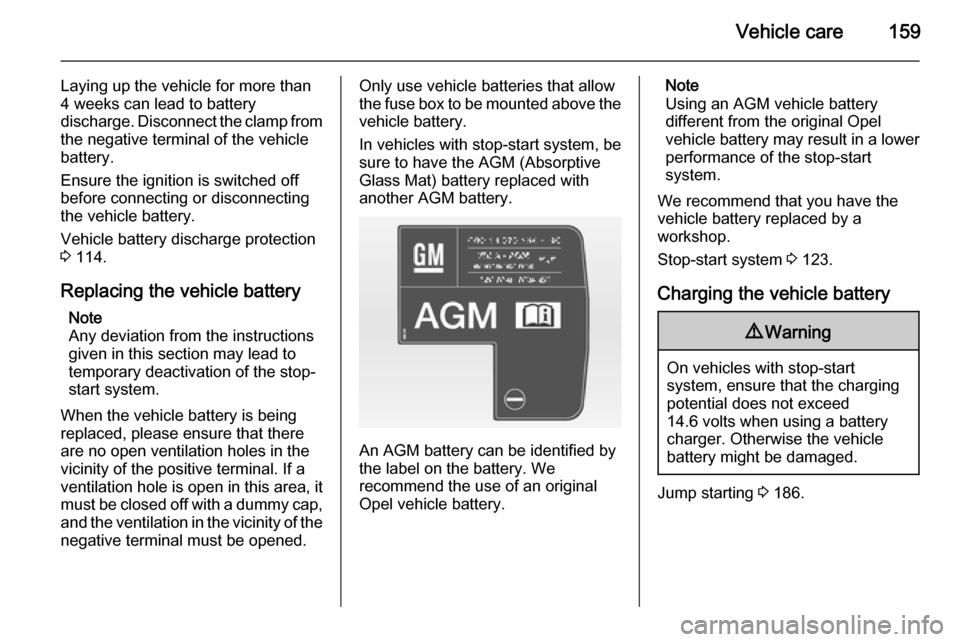jump start OPEL MOKKA 2014 Manual user
[x] Cancel search | Manufacturer: OPEL, Model Year: 2014, Model line: MOKKA, Model: OPEL MOKKA 2014Pages: 217, PDF Size: 6 MB
Page 132 of 217

130Driving and operatingFaultIn the event of a fault, g illuminates.
Additionally a code number or a
vehicle message is displayed in the
Driver Information Centre. Vehicle
messages 3 94.
The transmission no longer shifts
automatically. Continued travel is
possible with manual shifting.
Only the highest gear is available.
Depending on the fault, 2nd gear may also be available in manual mode.
Shift only when vehicle is at a
standstill.
Have the cause of the fault remedied by a workshop.
Interruption of power
supply
In the event of an interruption of
power supply, the selector lever
cannot be moved out of the P
position. The ignition key cannot be
removed from the ignition switch.
If the battery is discharged, start the
vehicle using jump leads 3 186.If the battery is not the cause of the
fault, release the selector lever.
1. Turn the ignition off and remove the key.
2. Depress and hold the brake pedal
and pull the parking brake lever
up.
3. Remove the cap on the console with a thin object such as ascrewdriver.
4. Insert a screwdriver into the opening as far as it will go.
5. Shift selector lever to N.
6. Remove the screwdriver from the slot.
7. Reinstall the cap.
8. Have the cause of the power supply interruption remedied by a
workshop.
Page 155 of 217

Vehicle care153Vehicle careGeneral Information...................153
Vehicle checks ........................... 154
Bulb replacement .......................161
Electrical system ........................167
Vehicle tools .............................. 172
Wheels and tyres .......................173
Jump starting ............................. 186
Towing ....................................... 187
Appearance care .......................190General Information
Accessories and vehicle
modifications
We recommend the use of genuine parts and accessories and factory
approved parts specific for your
vehicle type. We cannot assess or
guarantee reliability of other products
- even if they have a regulatory or
otherwise granted approval.
Do not make any modifications to the electrical system, e.g. changes of
electronic control units (chip tuning).Caution
When transporting the vehicle on
a train or on a recovery vehicle, the
mud flaps might be damaged.
Vehicle storage
Storage for a long period of time
If the vehicle is to be stored for several months:
■ Wash and wax the vehicle.
■ Have the wax in the engine compartment and underbody
checked.
■ Clean and preserve the rubber seals.
■ Fill up fuel tank completely.
■ Change the engine oil.
■ Drain the washer fluid reservoir.
■ Check the coolant antifreeze and corrosion protection.
■ Adjust tyre pressure to the value specified for full load.
■ Park the vehicle in a dry, well ventilated place. Engage first orreverse gear or set selector lever to P . Prevent the vehicle from rolling.
■ Do not apply the parking brake.
Page 161 of 217

Vehicle care159
Laying up the vehicle for more than
4 weeks can lead to battery
discharge. Disconnect the clamp from the negative terminal of the vehicle
battery.
Ensure the ignition is switched off
before connecting or disconnecting
the vehicle battery.
Vehicle battery discharge protection
3 114.
Replacing the vehicle battery Note
Any deviation from the instructions
given in this section may lead to
temporary deactivation of the stop-
start system.
When the vehicle battery is being
replaced, please ensure that there
are no open ventilation holes in the
vicinity of the positive terminal. If a
ventilation hole is open in this area, it
must be closed off with a dummy cap, and the ventilation in the vicinity of the
negative terminal must be opened.Only use vehicle batteries that allow
the fuse box to be mounted above the
vehicle battery.
In vehicles with stop-start system, be
sure to have the AGM (Absorptive
Glass Mat) battery replaced with
another AGM battery.
An AGM battery can be identified by
the label on the battery. We
recommend the use of an original
Opel vehicle battery.
Note
Using an AGM vehicle battery
different from the original Opel
vehicle battery may result in a lower performance of the stop-start
system.
We recommend that you have the
vehicle battery replaced by a
workshop.
Stop-start system 3 123.
Charging the vehicle battery9 Warning
On vehicles with stop-start
system, ensure that the charging potential does not exceed
14.6 volts when using a battery
charger. Otherwise the vehicle
battery might be damaged.
Jump starting 3 186.
Page 188 of 217

186Vehicle careJump startingDo not start with a quick charger.
A vehicle with a discharged battery
can be started using jump leads and the battery of another vehicle.9 Warning
Be extremely careful when starting
with jump leads. Any deviation
from the following instructions can
lead to injuries or damage caused
by battery explosion or damage to the electrical systems of both
vehicles.
9 Warning
Avoid contact of the battery with
eyes, skin, fabrics and painted
surfaces. The fluid contains
sulphuric acid which can cause
injuries and damage in the event
of direct contact.
■ Never expose the battery to naked flames or sparks.
■ A discharged battery can alreadyfreeze at a temperature of 0 °C.
Defrost the frozen battery before
connecting jump leads.
■ Wear eye protection and protective
clothing when handling a battery.
■ Use a booster battery with the same voltage (12 Volts). Its
capacity (Ah) must not be much less than that of the discharged
battery.
■ Use jump leads with insulated terminals and a cross section of at
least 16 mm 2
(25 mm 2
for diesel
engines).
■ Do not disconnect the discharged battery from the vehicle.
■ Switch off all unnecessary electrical
consumers.
■ Do not lean over the battery during jump starting.
■ Do not allow the terminals of one lead to touch those of the other
lead.
■ The vehicles must not come into contact with each other during the
jump starting process.■ Apply the parking brake, transmission in neutral, automatictransmission in P.
■ Open the positive terminal protection caps of both batteries.
Lead connection order:
1. Connect the red lead to the positive terminal of the booster
battery.
2. Connect the other end of the red lead to the positive terminal of the
discharged battery.
Page 189 of 217

Vehicle care187
3. Connect the black lead to thenegative terminal of the booster
battery.
4. Connect the other end of the black
lead to a vehicle grounding point,
such as the engine block or an
engine mounting bolt. Connect as far away from the discharged
battery as possible, however at
least 60 cm.
Route the leads so that they cannot
catch on rotating parts in the engine
compartment.
To start the engine: 1. Start the engine of the vehicle providing the jump.
2. After 5 minutes, start the other engine. Start attempts should be
made for no longer than
15 seconds at an interval of
1 minute.
3. Allow both engines to idle for approx. 3 minutes with the leads
connected.4. Switch on electrical consumers (e.g. headlights, heated rear
window) of the vehicle receiving
the jump start.
5. Reverse above sequence exactly when removing leads.Towing
Towing the vehicle
Disengage cap by using a
screwdriver and remove.
The towing eye is stowed with the vehicle tools 3 172.
Page 214 of 217

212
Heating ........................................ 38
Heating and ventilation system . 115
High beam ........................... 88, 106
Hill start assist ........................... 133
Horn ....................................... 14, 74
I
Identification plate .....................196
Ignition switch positions .............122
Immobiliser ............................ 27, 88
Indicators ...................................... 80
Information displays...................... 89
Initial drive information.................... 6 Instrument panel fuse box .........169
Instrument panel illumination control .................................... 111
Instrument panel overview ........... 10
Instrument panel storage ..............55
Interior care ............................... 192
Interior lighting ............................ 111
Interior lights ...................... 112, 167
Interior mirrors .............................. 29
Interruption of power supply ......130
Introduction .................................... 3
ISOFIX child restraint systems ....53
J
Jump starting ............................. 186K
Key, memorised settings ..............21
Keys ............................................. 20
Keys, locks ................................... 20
L
Lane departure warning .......86, 147
Lashing eyes ............................... 70
Lighting features .........................113
Light switch ................................ 105
Load compartment ................25, 67
Load compartment cover .............69
Load compartment fuse box ......171
Loading information .....................71
Low fuel ....................................... 88
M Malfunction indicator light ............85
Manual anti-dazzle ......................29
Manual mode ............................. 129
Manual transmission .................. 131
Manual windows ..........................30
Memorised settings ......................21
Mirror adjustment ........................... 8
Misted light covers .....................111
N
New vehicle running-in ..............122
Number plate light .....................166O
Object detection systems ...........141
Odometer ..................................... 80
Oil, engine .......................... 194, 198
Outside temperature ....................77
Overrun cut-off ........................... 123
P Parking ................................ 18, 125
Parking assist ............................ 141
Parking brake ............................ 133
Particulate filter ........................... 126
Performance .............................. 202
Performing work ........................154
Pollen filter ................................. 120
Power outlets ............................... 79
Power steering.............................. 86
Power windows ............................ 30
Preheating ................................... 87
Puncture ..................................... 181
R Radio Frequency Identification (RFID) ..................................... 209
Radio remote control ...................20
Reading lights ............................ 112
Rear carrier system ......................58
Rear floor storage cover ..............69
Rear fog light ....................... 89, 111
Rear view camera ...................... 142